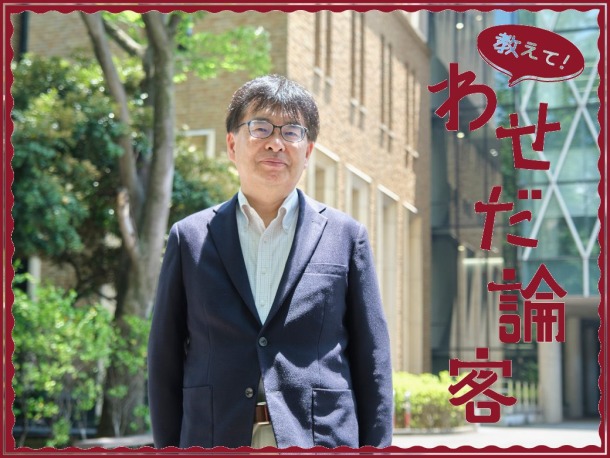
The wave of digitalization is sweeping over the health and medical fields these days. As technology advances, the importance of law in the social implementation of cutting-edge technology cannot be ignored.
The theme of the 2024 edition of "Tell me! Waseda Debaters" is "What is health?". We will consider health from the perspectives of several experts. Our guest this time is Professor Koezuka Tadao (Faculty of Law), who specializes in "Advanced Science and Technology and Law." We asked Professor Koezuka, who is knowledgeable about the legal issues surrounding advanced medical care, including remote medical care, about the state of health law in a digital society and its future possibilities.
How will the increasing digitalisation of the health and medical sector impact the legal sector?
The wave of the "Society 5.0" era, where people and technology are merging, is also sweeping through the health and medical fields, and it is predicted that the nature and interpretation of the law will change. However, the legal principles of "justice and fairness (※1)" will remain indispensable. Rather, I believe that the presence of people with legal knowledge will become even more important in designing a digitalized society.
(※1) “Fairness” means giving people the same treatment, while “equity” means treating people differently in accordance with their differences in order to achieve a goal.
INDEX
▼ Developments in cutting-edge science and technology give rise to new legal issues
▼The benefits of "online medical care" to improve access to medical care
▼The legal principles of "justice and fairness" are essential even in the age of Society 5.0
Developments in cutting-edge science and technology give rise to new legal issues
Please tell us about your current research topic, Professor Koezuka.
My specialty is "Advanced Science and Technology and Law," and I am researching the development of laws necessary to increase social acceptance of advanced science and technology such as metaverse, MaaS (Mobility as a Service), autonomous driving, and advanced medical care, with a focus on new risks and insurance law. In the field of health promotion and medical care, I am involved in a wide range of issues, from online medical care to organ transplants using iPS cells.
When developing new science and technology and implementing it in society, it is not just technical issues that are a challenge. Ethical, legal and social issues must also be overcome, and these issues are referred to as "ELSI," an acronym for Ethical, Legal and Social Issues. From my perspective, it is natural to sort out legal issues, but ultimately I think that the perspective of social issues, or social acceptability, is extremely important. If social acceptability remains low, cutting-edge science and technology cannot be implemented in society.
For example, let's imagine a system where medicines are delivered by drones to areas with poor transportation, such as remote islands. Even if this initiative is technically feasible, it will not be introduced unless regulations such as the Aviation Act and the Radio Act are met and risk management measures are in place. If laws are not put in place that take into account how to respond in the unlikely event of an accident and how to resolve compensation issues, it will be difficult to gain public understanding and new technologies will not be able to penetrate society.
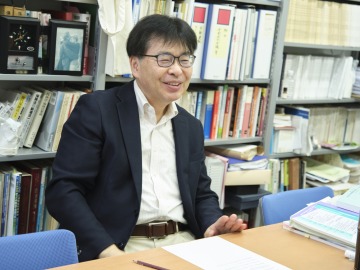
How do you think the nature of law will change with the development of cutting-edge science and technology?
The government has set out "Society 5.0" as the vision of the future society that Japan should aim for. This is a concept proposed as "a human-centered society that balances economic development with the resolution of social issues through a system that highly integrates cyberspace and physical space."
This fusion of cyberspace (virtual space) and physical space (real space) will also have a major impact on the judicial system. Modern private law has always had the distinction between people and things as its starting point. The subjects of rights are "people," and only natural persons and corporations are considered to be such people. However, modern private law does not anticipate the fusion of "people" and "things."
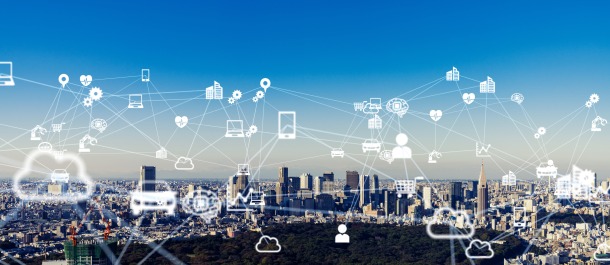
Image of the smart city that Society 5.0 aims for
For example, in Sweden, efforts are spreading to embed microchips in the hand and use them to unlock door security and for train tickets. In the future, with the development of IoT (*2), more and more things will be connected to the Internet than ever before. Smart homes that allow you to manage your health at home, such as bathrooms with weighing scales and beds that can manage your sleep, will also become common. By living in homes equipped with disease prevention and hospital-like testing functions, our bodies will also be connected to the Internet, potentially opening up a new field known as the "Internet of Human." This will result in our bodies being fused with digital technology, and it is predicted that new perspectives and regulations that are different from the conventional ones will be required in the legal field.
(※2) Abbreviation for Internet of Things. A mechanism for connecting things to the Internet.
What about in the health and medical fields? Please tell us if you have noticed any changes in terms of the law.
A familiar example is the pressure on insurance companies to change. Just like telematics car insurance, which uses a terminal installed in a car to evaluate the driver's driving condition (accident risk) and reflects this in the insurance premium, in the field of life insurance, it seems that the key to competition these days is how to prevent disease risks by using data to raise health awareness and reduce insurance payment amounts. In fact, health promotion medical insurance has appeared that reduces the risk of disease itself by monitoring the number of steps walked and the amount of calories burned in a day. There are also insurance products that allow you to accumulate points based on the number of steps you measure yourself or the results of your health check. The accumulated points can be used for things like discounts on insurance premiums.
In today's world, where advances in technology have made it possible to collect big data, individual disease risks that were previously unpredictable are now visible. If the homogeneity of group risks becomes a mere formality due to the individualization of risks, there is a concern that traditional insurance contracts will no longer be viable. In the future, appropriate calculation of insurance premiums according to each risk will become commonplace, and legal provisions will be required to accompany changes in business models.
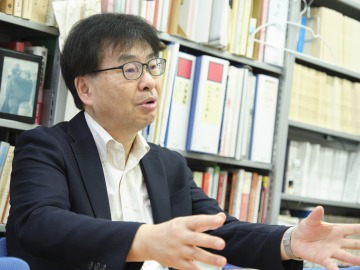
The benefits of "online medical care" to improve access to medical care
What health and medical topics are you particularly interested in?
Before joining Waseda, I worked at Kagawa University, where one of the themes I focused on was "telemedicine." I participated in demonstration experiments of drones delivering medicines to remote islands in the prefecture, and in particular, I was fortunate to participate in a consortium established with the cooperation of local residents, and was blessed with the opportunity to study through the Ministry of Land, Infrastructure, Transport and Tourism's Smart Island Promotion Demonstration Survey. This experiment was conducted with the aim of implementing aerial and underwater drones for online medical treatment in society, and it gave me the opportunity to consider legal knowledge regarding online medical treatment and the delivery of medical supplies by drone.
Left photo: Aerial drone. It can carry up to 5kg of equipment such as mobile electrocardiograms and medicines, and fly at a speed of 50km/h. A live weather system is installed at the takeoff and landing point, allowing real-time judgment of the safe flying environment.
Right photo: A boat-shaped water drone about 2m long and 1m wide. It can carry up to 50kg of cargo, so it can transport everyday items in addition to medicines.
Kagawa Prefecture, with its many inhabited islands, is said to be a medically advanced prefecture, and is the first local government in Japan to adopt telemedicine. The driving force behind this is Dr. Hara Kazuhiro (Professor Emeritus at Kagawa University, Honorary Chairman of the Japanese Telemedicine Society). Since the 1970s, he has conceived and developed remote fetal monitors, iCTG (intrapartum monitoring devices), which enable online perinatal care, and has also implemented online medical examinations using video conferencing systems. In addition, he has built an EHR (Electronic Health Record) called K-MIX (Kagawa Medical Information Network), creating a system that allows medical institutions in Kagawa Prefecture to share medical records.
This is an attempt to eliminate the inconvenience of pregnant women living on remote islands having to take a ferry to Takamatsu for regular checkups, and to ensure that islanders have consistent access to medical care, with the aim of providing comprehensive, regional medical care. In particular, Kagawa Prefecture's perinatal mortality rate (※3) was in the top five worst in the country in the 1970s, but it is now consistently in the top five and is known as a "baby-safe prefecture." This improvement in medical access was also reevaluated during the COVID-19 pandemic, when people were forced to be more cautious about going out.
(※3) Ratio of perinatal deaths (stillbirths after 22 weeks of pregnancy + early neonatal deaths) per 1,000 births per year
As long as everyone pays insurance premiums under the national health insurance system, regional disparities in access to medical care are unacceptable from the perspective of "fairness." Promoting online medical care will also help to eliminate these regional disparities.
Please tell us about the possibilities of online medical consultations in the future.
The reason why online medical care has not yet taken off in Japan seems to be that, compared to face-to-face medical care, it is not possible to perform palpation, percussion, or auscultation, which results in lower medical fee points, and hospitals are conservative in introducing new equipment and systems. In order to further expand it, a reexamination of the system and the development of a digital environment are required. On the other hand, examples of diseases and examinations that are well suited to online medical care include chronic diseases such as hypertension and diabetes, which are centered on medical interviews.
One thing we are particularly excited about with the spread of online medical care is the benefits it offers to people living overseas for long periods of time. If someone with a chronic illness is posted overseas, it can be a huge burden to leave their or their family's family doctor and be examined by a local doctor. In particular, if you or your family have a mental illness, it can be very worrying to be examined in an environment with a different language and culture. In that respect, being able to continue to be examined by the same doctor overseas allows you to live with peace of mind.
However, in that case, the question arises as to whether the laws that apply to online medical consultations aimed at overseas patients are Japanese or foreign. When an insured person (patient) in a foreign country receives online medical consultation from a doctor in Japan, one idea is to interpret it as meaning that Japanese public medical insurance (National Health Insurance and Health Insurance, etc.) applies if the person is qualified to be an insured person (patient). However, the medical consultation may conflict with the law in that country. In this regard, if we consider that Japanese doctors are providing a second opinion, there should be no problem.
In the future, if Japan and other countries open up a mutual cross-licensing system for medical licenses, it will likely give a boost to online medical consultations overseas. Another big issue is how to handle prescriptions through online consultations. In this way, while online medical consultations for overseas patients are effective in that they allow patients to receive treatment from their Japanese family doctor, there are likely to be a number of legal issues that need to be resolved.
The legal principles of "justice and fairness" are essential even in the age of Society 5.0
Professor Koezuka, please tell us if there are any social issues you feel exist in the field of law.
During the period of high economic growth, Japan achieved postwar reconstruction through rapid economic growth driven by infrastructure development and industrialization. At that time, laws and regulations served as the blueprint for developing infrastructure and promoting industrialization. The enactment of laws and regulations was the foundation of economic growth. Furthermore, the judicial power played an important role in protecting the human rights and interests of minorities that were at risk of being sacrificed in the process of developing infrastructure and realizing prosperity for the entire country.
In contrast, in modern society, as the digitalization of society advances, what is required is not infrastructure development or industrialization, but the design and expansion of the digital world. Who is designing the metaverse space and web services? It is not necessarily people with legal knowledge, but many of them are from science and engineering backgrounds.
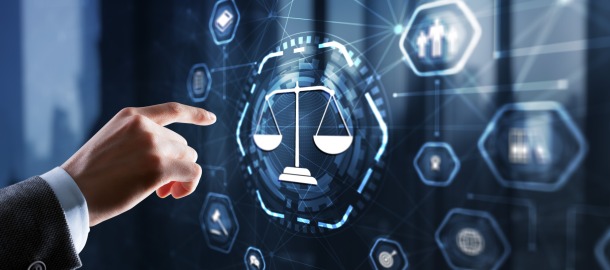
Images of "justice and fairness" in the digital society
Nowadays, large IT companies have become extremely powerful. I believe that people with legal knowledge are needed to design the digital field, which is driven by people working at these companies. In order to realize a diverse society without threatening anyone's rights in the digital society, the legal principles of "justice and fairness" are essential.
Lastly, please give a message to Waseda University students.
Even in the coming age of "Society 5.0," I believe that the importance of designing society based on the principles of "justice and fairness" will remain unchanged. I would like students who are interested in the digital field to study not only humanities subjects but also the basics of law, and then deepen their studies in information science and technology, so that they can draw a blueprint that is in line with "justice and fairness" in the digital world.
I would also like all students of law to think about the role of law from various perspectives. Of course, it is wonderful to aim to become a lawyer, and there are other wonderful paths to take. Whatever path you choose, I hope you will study humanities subjects thoroughly and always ask yourself what role the law should play as you face society.
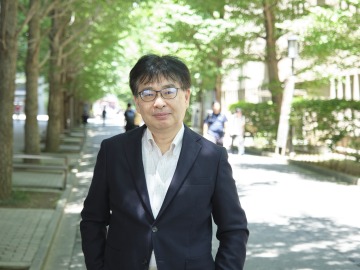
Tadao Koezuka
Faculty of Law Professor D., LL. D. in Law, affiliated with the Advanced Science, Technology and Law course, which opened in April 2022 at School of Law. He specializes in Advanced Science and Technology and Law, Risk and Law, Traffic and Law, Compensation and Law, and Metaverse and Law. In addition to teaching courses related to advanced medicine and automated driving, he is also in charge of "Metaverse and Law," a course endowed by Aioi Nissay Dowa Insurance Company, which started in the fall semester of 2023. He is engaged in research on how the law can enhance the social acceptability of advanced science and technology.
Interview and text: Akane Ichikawa (2017 Graduate of School of Culture, Media and Society)
Photo: Seiji Ishigaki
Image design: Ryo Uchida




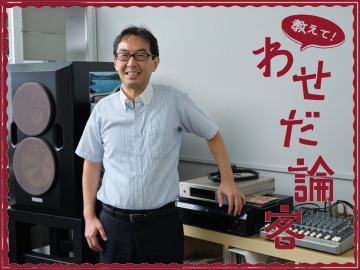
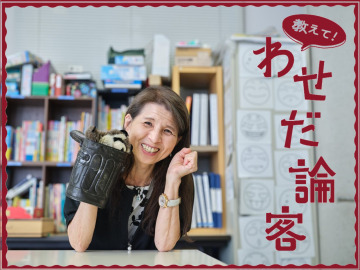
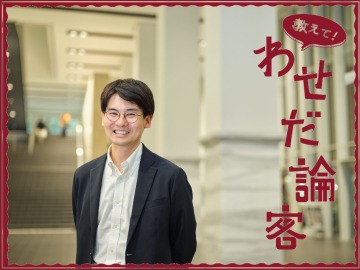

![[Save version] Map of the four main campuses](https://www.waseda.jp/inst/weekly/assets/uploads/2025/09/17cb2975123fc5103172ef60bd98608d-610x458.jpg)

